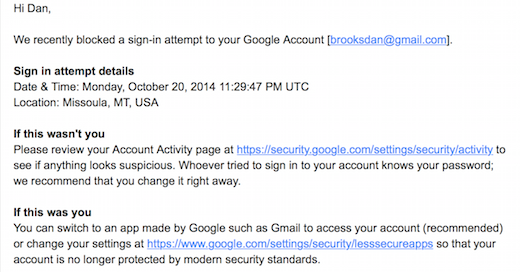I’m one of those poor fools with two email accounts. At some point in 2007, it seemed like a good idea to have one address for work and one for personal stuff, because…profit? The concrete advantage was not clear, but it sounded like something an organized person might do. Now I have two essentially interchangeable addresses, one at Gmail and one at the great-in-theory Apple domain me.com. I manage both addresses with Apple Mail, so I generally forget that I even have two Inboxes until one stops working. When Gmail stopped this weekend, I assumed I had run into a bug in the new Mac OS. Instead, I ran into the minor masterpiece of insinuation that is the subject of today’s Close Reading.
Here’s the email I got from Google yesterday:
It’s worth noting that this blocked sign-in attempt originated on my home internet connection, from the same machine I’ve been using for the last two years. Maybe the new version of Mail tripped it, but that’s the only element of this setup that Google shouldn’t recognize. It’s also worth noting that the problem was quickly and easily resolved. A link in the email let me disable Gmail’s stricter settings and return to an account that is “no longer protected by modern security standards.”
From a functional standpoint, this message muddied the line between tech support and advertisement. Yes, it identified and fixed a problem with my email, but the problem was that Google noticed I wasn’t using the Gmail app. Once I read and understood the paragraph about how Gmail uses “modern security standards” that other apps don’t, I could click a radio button and return to normal functionality.
Here’s what that radio button looked like:
Presumably, the devices and apps using what Google considers “insecure sign-in technology” are not Google products. “Less secure apps” seems to be a euphemism for “third-party apps.” This warning screen is a kind of native advertising; it appears in the context of Gmail’s functionality,1 but it solves a problem of Google’s own making. Its real purpose is to remind me that there’s a Gmail app, plus an Android OS and a bunch of Google partners that might serve me better than less secure devices.
Is that unethical? Only insofar as it kept me from getting a couple of client emails in timely fashion and almost derailed MasterTweet Theatre. I did not really suffer under Google’s advertechnical warning. It was weird, though, and as near as I can tell unprecedented.
Google is a search engine and, through Gmail, an email service. But it’s also a means to use that search engine, via Chrome, and a tool for accessing that email through the Gmail app. If Google were a television network, it would be broadcasting the shows but also producing them, plus manufacturing some TV sets. If, every once in a while, you plugged in your TV and it warned you that it would work better if you watched a particular channel, you wouldn’t exactly rend your garments. But I wouldn’t call it a feature, either.







If Google starts messin with my much needed dosage of Master Tweet Theatre they cross a line that shouldn’t be crossed.
Weirdly I also jumped on that two mail addresses hypetrain back then. now I have three addresses which I use without any real system behind it but they are so widespread that it would be way to much work to revert back to one.
I also got this email, and noted with disdain that I have no idea how to begin measuring the security of my own accounts and apps. If I knew were to begin, I might be able to better parse what is a helpful interruption and what is a “brief message from our sponsors.”